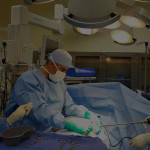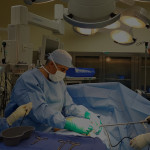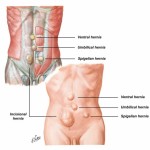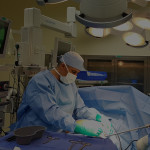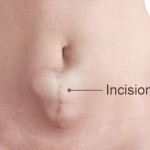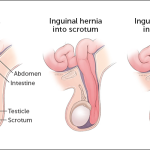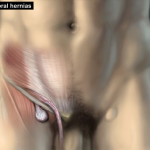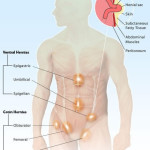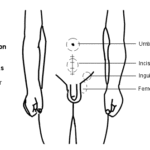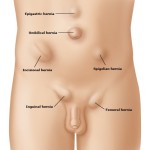TYPES OF HERNIA | DIAPHRAGMATIC HERNIAS | HIATAL HERNIA | PARA ESOPHAGEAL HERNIA
Para Esophageal Hernia
A relatively uncommon condition, paraesophageal hiatal hernia accounts for a small percentage of hernia cases, but can create an emergency situation. Paraesophageal hiatal hernia occurs when the stomach pushes into the chest through the opening for the esophagus and can’t return back to the belly. When this causes painful symptoms, the patient must be treated to avoid complications. The symptoms of hiatal hernia often mimic those of other gastrointestinal conditions.
Accounting for only five percent of hiatal hernias, the paraesophageal hiatal hernia is also the more serious of the two hiatal hernia types. Although many patients do not experience symptoms, it can cause complications and require surgery.
A hernia occurs when one part of the body pushes into another part of the body where it doesn’t belong. In this case, a hiatal hernia is when the stomach pushes through the hiatus, an opening in the diaphragm usually reserved for the esophagus. When the stomach pushes through the opening with the esophagus and slides back, it’s called a sliding hiatal hernia, but when it stays where it doesn’t belong, it’s called a paraesophageal hiatal hernia.
Usually patients do not feel symptoms of paraesophageal hernia until there is an issue. When the hiatus strangles the stomach, patients feel hiatal hernia pain.
Causes of Paraesophageal Hernia
While paraesophageal hernia research continues to bring clarity to this condition, the causes of paraesophageal hernia are not fully known. Doctors have made a connection between gastroesophageal reflux disease (GERD) because many patients with paraesophageal hernia also have GERD. On the other hand, many times the conditions occur separately and therefore may not be related.
While some causes are not certain, doctors have noted these paraesophageal hernia causes:
- A large hiatal opening from birth
- A weakness in the wall of the abdomen from birth
- Pregnancy or obesity puts extra weight on the abdomen
- Heavy coughing or straining during bowel movements also increase pressure
- Aging
- Previous surgery
- Of those diagnosed with hiatal hernia, only half experience any symptoms of paraesophageal hernia, and it is usually mild heartburn. Regardless of the causes of paraesophageal hernia, surgery is usually the best treatment option when the hernia begins to cause pain.
Symptoms and Signs of Paraesophageal Hernia
About 50% of patients diagnosed with hiatal hernia do not feel pain from the hernia. For those that do feel paraesophageal hernia symptoms, the pain is usually mistaken for acid reflux or heartburn. For more severe cases of paraesophageal hernia, patients can feel intense pain and may need immediate medical attention. These signs of paraesophageal hernia include the following conditions:
- While some causes are not certain, doctors have noted these paraesophageal hernia causes:
- Heartburn
- Sudden chest pain that can’t be treated with antacid
- Difficulty swallowing
- Shortness of breath
- Stomach pain
- Indigestion
- Nausea and Vomiting
While only some patients report feeling symptoms of paraesophageal hernia, the patients with severe pain usually indicate a serious complication or related condition.
Stages of Paraesophageal Hernia
The two types of hiatal hernia vary in severity, the stages of paraesophageal hernia and sliding hernia. The first stage of hiatal hernia is a sliding hiatal hernia, a condition where the stomach pushes through the diaphragm into the chest and the goes back again. The second stages of hiatal hernia is known as the paraesophageal hernia. At this stage, the hiatal hernia stays in the chest instead of returning to its proper position. While many patients do not feel symptoms of paraesophageal hernia, the condition can cause complications of not treated. The third stage of paraesophageal hiatal hernia combines the two types of hiatal hernia. The stomach stays above the hiatus, but portions of it slides back into the correct place. The fourth of the paraesophageal hernia stages is when the entire stomach and organs attached to it is pushed into the chest cavity, including the colon and spleen. This fourth stage is rare, and therefore is not often categorized. Regardless of the stage of paraesophageal hernia.
TYPES OF HERNIA | DIAPHRAGMATIC HERNIAS | HIATAL HERNIA | PARA ESOPHAGEAL HERNIA
Hernia Surgery | Hernia Surgery in Dubai | Hernia Surgery in UAE | Best Hernia Surgeon in Dubai | Hernia Specialist | Hernia Appointment | Hernia Repair | Hernia Surgery Cost | Hernia Surgery Appointment | Hernia Inquiry in Dubai | Hernia Clinic in Dubai | Hernia Team | Hernia Treatment


